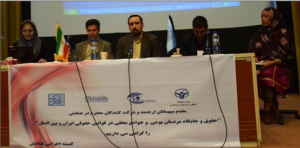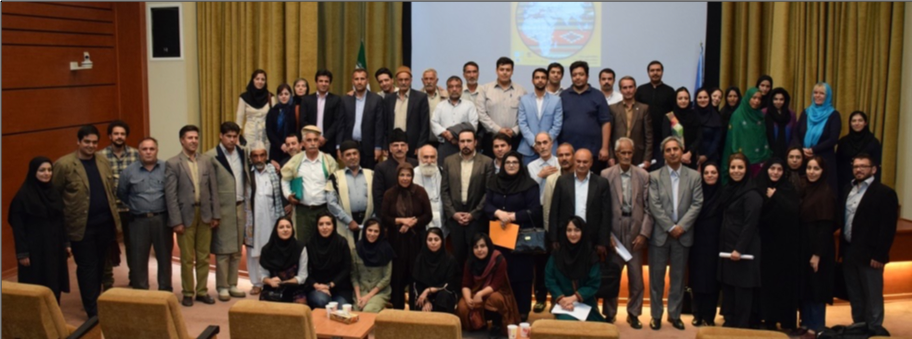First published on 10/29/2015, and last updated on 03/29/2018
By: Fereshteh Sabetian ICCA Consortium Regional Coordinator for West Asia and Farnaz Afshar, Cenesta
In October 12th 2015, Iran’s first seminar on the rights of indigenous peoples and local communities was offered by Cenesta and the Scientific Research and UNESCO Chair of Human Rights, Peace and Democracy department of Shahid Beheshti University in Tehran. The programme focused on indigenous peoples’ (IP) and local communities’ (LC) rights within the framework of legal institutions at both national and international levels. The participants included representatives from government offices, community elders and representatives of local communities and indigenous peoples, as well as university professors and students, experts in law and environment and local NGOs. Dr. Simone Lovera, PhD in international law and head of Global Forest Coalition (also an ICCA Consortium member) from Paraguay, and Dr Swati Shresth, expert in history and social science and university professor from India were guests at the seminar.
 The seminar was opened by Dr Fadaee, director of education at the Chair. Mr. Ansari, representative of the office of Cultural and Social Affairs at Ministry of Oil, followed with a message of welcome. Two short speeches followed, one given by the head of the Scientific Research and UNESCO Chair, Dr Mir Mohammad Sadeghi, and the other by Mr Zargar, Assistant director of rural development and investment office of the president. Next, Dr Taghi Farvar, head of the board of directors at Cenesta and President of ICCA Consortium, began his talk stressing the importance of traditional and indigenous knowledge in today’s world. He described how much he had learned from indigenous peoples worldwide, after many years of purely academic education. He emphasized the rich knowledge indigenous peoples have acquired through real interaction with nature over the course of thousands of years. As ICCA Consortium President, he urged, “First we need to get to know these peoples”. There are 1.5 million pastoralist nomads in Iran who are key primary producers for the country, yet they are among those whose rights have been most neglected.
The seminar was opened by Dr Fadaee, director of education at the Chair. Mr. Ansari, representative of the office of Cultural and Social Affairs at Ministry of Oil, followed with a message of welcome. Two short speeches followed, one given by the head of the Scientific Research and UNESCO Chair, Dr Mir Mohammad Sadeghi, and the other by Mr Zargar, Assistant director of rural development and investment office of the president. Next, Dr Taghi Farvar, head of the board of directors at Cenesta and President of ICCA Consortium, began his talk stressing the importance of traditional and indigenous knowledge in today’s world. He described how much he had learned from indigenous peoples worldwide, after many years of purely academic education. He emphasized the rich knowledge indigenous peoples have acquired through real interaction with nature over the course of thousands of years. As ICCA Consortium President, he urged, “First we need to get to know these peoples”. There are 1.5 million pastoralist nomads in Iran who are key primary producers for the country, yet they are among those whose rights have been most neglected.
The Seminar continued with a panel dedicated to IPs and LCs Social and Economic Rights. Dr. Gheibi from the Forest, Rangeland and Watershed Organisation (FRWO), an agency of the government, stated the importance of IP and LC in nature conservation processes and in reviving natural resources. Two representatives from local and indigenous peoples of Iran joined the second panel as speakers. Ms Mania Khangah, environmental activist and representative of the local communities of Qeshm island, announced the formation of a Women’s Committee in Qeshm, which will have an important impact on livelihoods in marine and coastal areas in the island. Then, Mr Nederpour, head of the Union of Camel Herders of Iran (UNICAMEL- ICCA Consortium member) and head of the sustainable livelihood fund of the Qashqai tribal confederacy, brought attention to the legal gap that prevents IPs and LCs from participating in decisions, policy making, management and monitoring in Iran. He said that although appropriate laws and legislation exist in Iran, they are not properly implemented. Another key speaker was Dr Moqadassi, assistant director of FRWO. He stressed the vital role of IPs and LCs in conserving natural resources, and emphasised the importance of transmitting traditional knowledge to new generations.
 During the third panel discussion, Dr. Afshari, head of the women’s rights and NGOs departments at the UNESCO Chair of Human Rights, Peace and Democracy, detailed the environmental laws related to IPs and LCs at national and international levels. The final panel took up the subject of international recognition of IPs and LCs, and the rights of indigenous peoples within the Convention on Biological Diversity (CBD) and Nagoya protocol. A draft of a Social, Cultural and Economic Environmental charter (SCEE charter) was distributed among the participants for further comments and suggestions. The closing event was a recitation of the declaration on the rights of indigenous peoples and local communities, jointly prepared by the Chair of Human Rights, Peace and Democracy and Cenesta.
During the third panel discussion, Dr. Afshari, head of the women’s rights and NGOs departments at the UNESCO Chair of Human Rights, Peace and Democracy, detailed the environmental laws related to IPs and LCs at national and international levels. The final panel took up the subject of international recognition of IPs and LCs, and the rights of indigenous peoples within the Convention on Biological Diversity (CBD) and Nagoya protocol. A draft of a Social, Cultural and Economic Environmental charter (SCEE charter) was distributed among the participants for further comments and suggestions. The closing event was a recitation of the declaration on the rights of indigenous peoples and local communities, jointly prepared by the Chair of Human Rights, Peace and Democracy and Cenesta.
For Persian readers, please find more information here!
